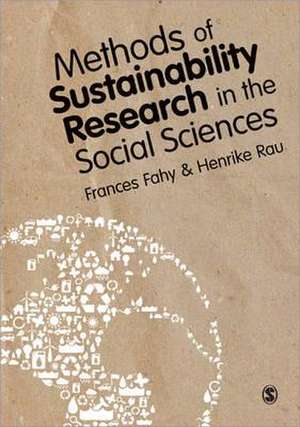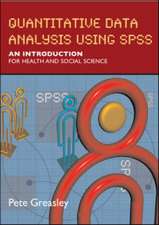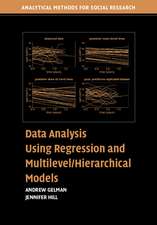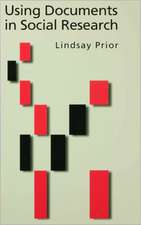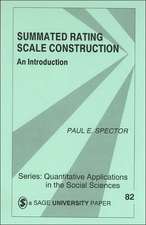Methods of Sustainability Research in the Social Sciences
Editat de Frances Fahy, Henrike Rauen Limba Engleză Paperback – 20 ian 2013
- Part I: examines the key challenges inherent to social scientific sustainability research, focusing in particular on methodological questions that arise from recent efforts towards greater disciplinary integration.
- Part II: discusses methodologies aimed at the investigation of attitudes and behaviour observable at the local level - from families and households to individual organisations within communities.
- Part III: focuses on comparative sustainability research across different levels of socio-political organisation - from cities and regions to nation-states.
- Part IV: covers recent developments which recognise the significance of time for sustainability research and which offer innovative methodological approaches that focus on life events and long-term outcome.
- Part V: offers a critical assessment of current and future trends in social-scientific sustainability researc.
| Toate formatele și edițiile | Preț | Express |
|---|---|---|
| Paperback (1) | 412.47 lei 6-8 săpt. | |
| SAGE Publications – 20 ian 2013 | 412.47 lei 6-8 săpt. | |
| Hardback (1) | 1060.97 lei 6-8 săpt. | |
| SAGE Publications – 20 ian 2013 | 1060.97 lei 6-8 săpt. |
Preț: 412.47 lei
Nou
78.93€ • 82.61$ • 65.69£
Carte tipărită la comandă
Livrare economică 31 martie-14 aprilie
Specificații
ISBN-10: 0857025228
Pagini: 232
Dimensiuni: 156 x 234 x 15 mm
Greutate: 0.36 kg
Ediția:1
Editura: SAGE Publications
Colecția Sage Publications Ltd
Locul publicării:London, United Kingdom
Recenzii
Sustainable development, or sustainability, is one of the defining issues of our time. However relatively little has been written about different approaches about how to systematically research this issue. This innovative and important book fills that gap and will be widely read and used by both academics and practitioners alike.
Fahy and Rau’s collection provides useful perspectives on how ‘sustainability’ as a term can be opened up conceptually and methodologically. The essays will prove attractive to researchers pursuing interdisciplinary questions on how societal development can be reconciled with the consumption of resources in different regional and economic contexts.
This international and interdisciplinary collection exploring the concepts and methods of social science research into sustainability will be valuable for students, researchers and community activists wishing to research the need for or impact of environmental policies. Throughout, the focus is upon helping individual researchers to think critically about ‘sustainability’, ask salient questions and produce robust conclusions.
An original and significant contribution to contemporary discussions surrounding the question of methodological approaches to researching and thinking about sustainability and ‘green’ issues internationally. The excellent selection of chapters and case studies offered gives the reader a range of approaches and tools that can be developed within other contexts, as well as identifying critical faultlines in the field and offering suggestions for future research.
This book offers two critical points of discussion that are relevant to all those interested in 'sustainability' as a nexus between human society and environmental resources, including researchers, teachers and students, as well as policy makers.
It takes on a bold step towards that dual aim, one that merits further discussion and exploration in the research community, but also in classrooms and in the public realm.
Methods of Sustainability Research in the Social Sciences is not a “How To” book with tips made for debutants or graduate students in search for a textbook to start their masters; it is rather for doctoral students and academics who feel they need interdisciplinary or even transdisciplinary methods for the understanding of environmental issues. This is the main strength of this volume which does not concentrate on results or conclusions as such but rather on the studying and comparison of fresh methodologies related to sustainability.
Cuprins
PART ONE: MEASURING THE IMMEASURABLE? THE CHALLENGES AND OPPORTUNITIES OF SUSTAINABILITY RESEARCH IN THE SOCIAL SCIENCES
Sustainability Research in the Social Sciences - Concepts, Methodologies and the Challenge of Interdisciplinarity - Henrike Rau and Frances Fahy
PART TWO: RESEARCHING LOCAL LIVES: EXPERIENCES OF (UN)SUSTAINABILITY AMONG INDIVIDUALS, HOUSEHOLDS AND COMMUNITIES
Household Analysis: Researching 'Green' Lifestyles, A Survey Approach - Stewart Barr and Jan Prillwitz
Social Groups and Collective Decision-making: Focus Group Approaches - Anna Davies
Local Lives and Conflict: Towards a Methodology of Dialogic Research - Mark Garavan
PART THREE: COMPARATIVE RESEARCH ON THE SUSTAINABILITY PERFORMANCE OF CITIES, REGIONS AND NATION-STATES
Sustainable Development of What? Contesting Global Development Concepts and Measures - Su-ming Khoo
Biophysical Indicators of Society-Nature Interaction: Material and Energy Flow Analysis, Human Appropriation of Net Primary Production and the Ecological Footprint - Veronika Gaube, Helmut Haberl, Karl-Heinz Erb
Mapping for Sustainability: Environmental Noise and the City - Enda Murphy and Eoin A King
PART IV: TIME IN FOCUS
Everyday Life in Transition: Biographical Research and Sustainability - Melanie Jaeger-Erben
Time and Sustainability - Henrike Rau and Ricca Edmondson
PART V: CURRENT DEVELOPMENT AND FUTURE TRENDS
Researching Complex Sustainability Issues: Reflections on Current Challenges and Future Developments - Frances Fahy and Henrike Rau
Descriere
Sustainability is a key concept used by social scientists interested in interactions between human society and the environment. This text offers a systematic and critical review of established and emerging methodological approaches, as well as tools for the integrated investigation of sustainability questions. Recognising the significance of scale for sustainability efforts and measurement, its scope ranges from the local to the global. Divided into five sections:
- Part I: examines the key challenges inherent to social scientific sustainability research, focusing in particular on methodological questions that arise from recent efforts towards greater disciplinary integration.
- Part II: discusses methodologies aimed at the investigation of attitudes and behaviour observable at the local level - from families and households to individual organisations within communities.
- Part III: focuses on comparative sustainability research across different levels of socio-political organisation - from cities and regions to nation-states.
- Part IV: covers recent developments which recognise the significance of time for sustainability research and which offer innovative methodological approaches that focus on life events and long-term outcome.
- Part V: offers a critical assessment of current and future trends in social-scientific sustainability researc.
Bringing together contributions from international social scientists, this is the resource for academics and practitioners interested in sustainability research. It will be a core teaching text for undergraduate and postgraduate courses in sustainability and sustainable development, geography, environmental sociology and the environmental sciences.
